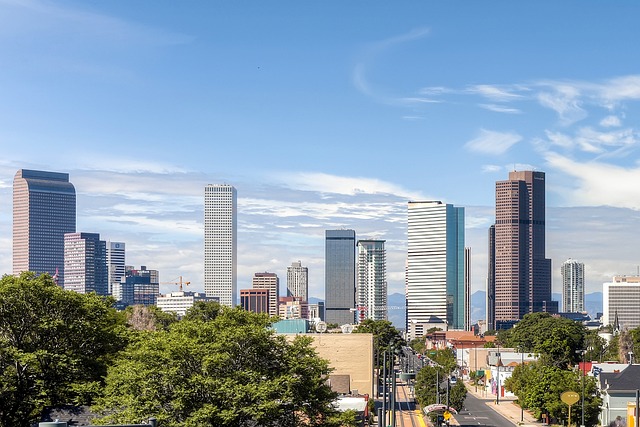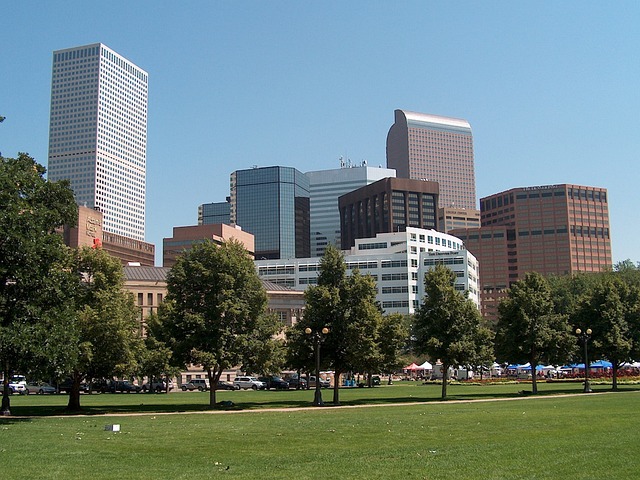Asbestos Removal Denver services have become critical in addressing the health risks associated with asbestos, a once-common material used extensively in Denver's construction from the late 19th to mid-20th century. Due to its heat and fire-resistant properties, asbestos was widely used until its hazardous effects on human health became apparent. Asbestos fibers can cause severe respiratory diseases like mesothelioma and lung cancer upon disturbance. In response, specialized Asbestos Removal Denver companies now operate with strict safety measures to manage the degradation of asbestos-containing materials (ACMs) in older buildings, ensuring public health is protected through containment, removal, and disposal. These professionals strictly adhere to safety protocols mandated by environmental health agencies and the Colorado Department of Public Health and Environment, which require licensed asbestos inspectors for any work on structures built before 1980. Asbestos abatement in Denver must be carried out by certified experts who comply with the National Emission Standards for Hazardous Air Pollutants, using proper containment and disposal techniques to prevent fiber release. Homeowners planning renovations or demolitions are required to follow stringent regulations, secure permits, and use personal protective equipment throughout the process. Asbestos Removal Denver services not only execute the removal but also navigate complex compliance requirements, ensuring safe and legal abatement practices in the city's ongoing battle to mitigate asbestos risks. These services are indispensable for maintaining a healthy environment for Denver's residents.
Denver’s architectural legacy often hides a dangerous truth: asbestos, a material once celebrated for its fire-resistant properties. With the rise of awareness on its health risks, understanding and safely managing this hazard have become paramount. This article delves into the intricacies of asbestos removal in Denver, guiding homeowners through the historical use, potential health dangers, strict regulations, and professional processes that ensure safe abatement. Navigating the complexities of asbestos in Denver requires knowledgeable action to protect public health and preserve the city’s built environment.
- Understanding Asbestos: A Historical Perspective in Denver Housing and Construction
- The Risks of Asbestos Exposure: Health Implications for Residents of Denver
- Navigating Asbestos Removal Regulations in Denver: What Homeowners Need to Know
- Professional Asbestos Removal Processes in Denver: Ensuring Safety and Compliance
Understanding Asbestos: A Historical Perspective in Denver Housing and Construction

Denver’s history with asbestos dates back to the late 19th century when the city began its rapid expansion and industrialization. Asbestos, revered for its fire-resistant and insulating properties, was commonly integrated into building materials and products due to its durability and heat resistance. Throughout the early to mid-20th century, asbestos became a staple in construction and housing across Denver, found in a variety of applications from residential homes to commercial buildings, schools, and public institutions. Its use was pervasive, reflecting the industrial ethos of the time, where safety concerns were often secondary to economic and developmental interests.
As awareness of the health hazards associated with asbestos exposure grew, Denver’s building stock from this era posed a silent threat. The city faced the challenge of addressing the presence of asbestos in older structures. Asbestos Removal Denver services became critical in safeguarding public health, especially as these materials began to degrade and release fibers that could cause serious respiratory diseases such as mesothelioma and lung cancer. Today, the expertise of specialized Asbestos Removal Denver companies is essential in managing the risks associated with this legacy material. Their work involves careful containment, meticulous removal, and safe disposal protocols to ensure the safety of both workers and residents, reflecting a shift from past practices to modern, responsible environmental stewardship.
The Risks of Asbestos Exposure: Health Implications for Residents of Denver

Asbestos, a naturally occurring mineral once extensively used in building materials due to its fire-resistant and insulating properties, poses significant health risks when disturbed or damaged. In Denver, a city with a rich history of industrial activity, this concern is particularly acute. Residents and workers may encounter asbestos in older homes, commercial buildings, and facilities where it was previously incorporated into the structure. Exposure to asbestos fibers can lead to severe respiratory diseases, including mesothelioma, lung cancer, and asbestosis, all of which can have devastating health implications. It is crucial for individuals undertaking renovation, demolition, or maintenance work in Denver to recognize the potential presence of asbestos and to engage with professional asbestos removal services like those available through Asbestos Removal Denver. These experts adhere to strict protocols to safely remove and dispose of asbestos-containing materials, thereby mitigating the risks associated with this hidden hazard. The city’s environmental health agencies advocate for rigorous asbestos abatement practices to protect public health, emphasizing the importance of professional intervention when dealing with this silent threat.
Navigating Asbestos Removal Regulations in Denver: What Homeowners Need to Know

When undertaking renovations or demolitions in Denver, it’s imperative for homeowners to comprehend and adhere to local asbestos removal regulations. Asbestos, a hazardous material once commonly used in construction due to its fire-resistant properties, poses significant health risks if disturbed during building activities. In Denver, the Colorado Department of Public Health and Environment sets forth specific guidelines for asbestos abatement to protect public health and safety. Homeowners planning any intrusive work on structures built before 1980, when asbestos use was banned in the US, must first ascertain whether asbestos is present. This involves hiring licensed asbestos inspectors to conduct testing and determine if there’s a need for removal. The process of asbestos removal in Denver is not a DIY task; it requires professional intervention certified under the state’s regulations. These professionals ensure compliance with the National Emission Standards for Hazardous Air Pollutants, which dictate proper containment and disposal methods to minimize airborne fibers. Homeowners must obtain permits for asbestos removal projects, adhere to specific work practices, and use appropriate personal protective equipment. Understanding these regulations and requirements is crucial for safeguarding the health of occupants and workers, as well as avoiding legal penalties. Thus, engaging with certified asbestos abatement contractors in Denver who are well-versed in these regulations is essential for successful and safe removal projects. These experts not only handle the physical removal but also navigate the necessary paperwork, ensuring that all local, state, and federal guidelines are met.
Professional Asbestos Removal Processes in Denver: Ensuring Safety and Compliance

In Denver, the safe removal and disposal of asbestos are paramount due to its hazardous nature. Professional asbestos removal services in Denver adhere to strict protocols that align with both local and federal regulations. These protocols are designed to ensure the well-being of individuals living in and around the affected area, as well as the environment. The process begins with a thorough assessment by certified professionals who determine the extent of asbestos contamination. This initial step is crucial for planning an effective removal strategy that minimizes exposure to harmful fibers. Once the plan is in place, trained personnel employ specialized equipment and techniques to carefully remove the asbestos-containing material. This removal is done meticulously, with attention to containment measures to prevent any release of asbestos into the air. After the removal, affected areas are sealed off and a detailed cleanup operation commences. Throughout this process, safety remains the top priority, with continuous monitoring to ensure compliance with air quality standards set by the Environmental Protection Agency (EPA) and the Colorado Department of Public Health and Environment. Asbestos Removal Denver companies are well-versed in these regulations and dedicated to maintaining a safe environment for all residents. The commitment to safety extends beyond the removal itself; it encompasses every step, from initial inspection to final cleanup, ensuring that homes and businesses in Denver can be safely reoccupied once the risk of asbestos exposure has been mitigated.
Asbestos poses a significant health risk that Denver residents must address with due diligence. The historical use of asbestos in construction within the city has led to its presence in many older buildings, emphasizing the need for informed action. Homeowners and property managers in Denver must be well-versed in local asbestos removal regulations to ensure compliance and safety during abatement processes. By engaging professional asbestos removal services in Denver, residents can effectively manage this hazard, safeguarding their health and adhering to strict environmental standards. It is crucial to handle asbestos with care, given its potential to impact one’s well-being. The city’s response to asbestos concerns underscores the importance of responsible and expert removal practices, which are key to maintaining a healthy living environment in Denver.
